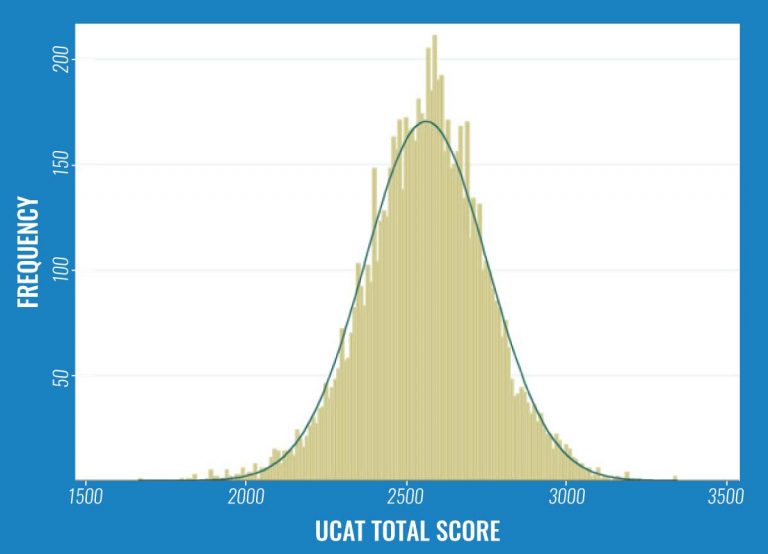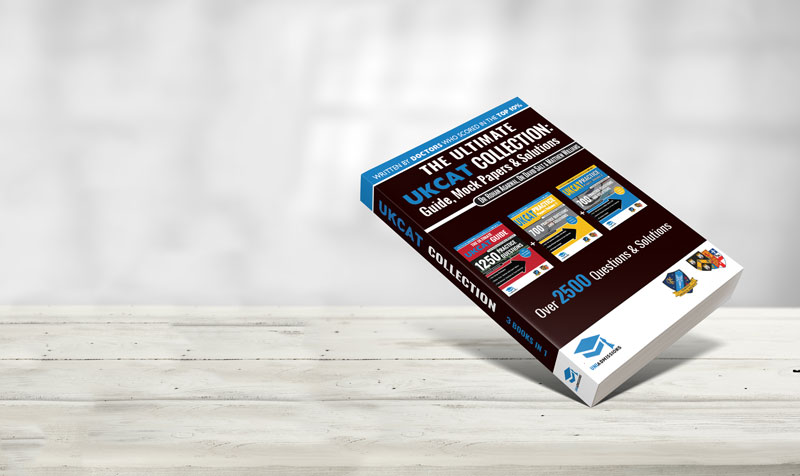UCAT QUICK NAVIGATION MENU
WHAT IS THE UCAT?
UCAT stands for University Clinical Aptitude Test. It is the admissions test used by the UCAT ANZ Consortium of universities in Australia and New Zealand. It is one of the criteria they use to select candidates for entry for Medicine, Clinical Science, and Dentistry courses, the other criteria being your academic performance (ATAR) and your interviews.
WHAT IS THE STRUCTURE OF THE UCAT?
The UCAT is a 2 hour computer-based test which you take at your local Pearson Vue test centre. You can find your closest Pearson Vue test centre by clicking here. The test consists of five sections. The sections are as follows:
| UCAT Section | Number Of Questions | Duration | What Does It Test? | Scoring |
|---|---|---|---|---|
| Verbal Reasoning | 44 | 21 minutes | Tests your reading comprehension skills and ability to critically evaluate written information. | 300-900 |
| Decision Making | 29 | 31 minutes | Tests your application of logic and your approach to problem-solving based on complex information. | 300-900 |
| Quantitative Reasoning | 36 | 24 minutes | Tests your ability to evaluate numerical problems and perform mathematical calculations. | 300-900 |
| Abstract Reasoning | 55 | 13 minutes | Tests your aptitude in recognizing patterns and inferring relationships from a set of information. | 300-900 |
| Situational Judgement | 69 | 26 minutes | Tests your ability to make decisions in a clinical environment and your understanding of the role and responsibilities of a medical practitioner. | Band 1-4 |
Number of Questions: 44
Duration: 21 Minutes
Tests your reading comprehension skills and ability to critically evaluate written information
Scoring: 300-900
Number of Questions: 29
Duration: 31 Minutes
Tests your application of logic and your approach to problem-solving based on complex information.
Scoring: 300-900
Number of Questions: 36
Duration: 24 Minutes
Tests your ability to evaluate numerical problems and perform mathematical calculations.
Scoring: 300-900
Number of Questions: 55
Duration: 13 Minutes
Tests your aptitude in recognizing patterns and inferring relationships from a set of information.
Scoring: 300-900
Number of Questions: 69
Duration: 26 Minutes
Tests your ability to make decisions in a clinical environment and your understanding of the role and responsibilities of a
medical practitioner
Scoring: Band 1-4
Each UCAT subtest tests different essential skills and proficiencies expected of a prospective student and eventual doctor or dentist. Applicants who score highly in the UCAT are generally those who have the most desirable qualities for these professions, and therefore it’s crucial to perform highly in it.
The first four UCAT subtests test cognitive abilities, the fifth UCAT subtest is more about real-world application of medical practice.
Why are these skills important? Click on the section for in-depth information and tips.
- Verbal Reasoning is an important skill because people in medical professions need to be able to take in lots of information and select the most crucial and relevant details. They must also be able to understand complex information but communicate it effectively and clearly to patients. During your degree, you will also have to read scientific journals and research papers and interpret researchers’ findings with accuracy.
- Decision Making is an important skill for doctors and dentists because they’re frequently under pressure to make decisions in complex situations and use advanced problem-solving skills while assessing risk.
- Quantitative Reasoning is an important skill because doctors and dentists are frequently faced with data they have to interpret and review, such as medication quantities based on weight or other factors.
- Abstract Reasoning is an important skill for doctors and dentists because they are frequently faced with problems that require them to draw conclusions from complex sets of information, some of which might be unclear or difficult to find commonalities between. For instance, diagnosing correctly often requires doctors to identify patterns that others wouldn’t easily see.
- Situational Judgement is a test that assesses potential medical practitioners’ integrity, empathy, teamwork, and ability to respond to real-world hypothetical situations with appropriate behaviour.
WHICH ARE THE UNIVERSITIES THAT USE THE UCAT?
| University and Country | Course or Programme |
|---|---|
| The University of Adelaide, Australia | Medicine, Dental Surgery |
| Curtin University, Australia | Medicine |
| Flinders University, Australia | Medicine, Clinical Sciences |
| Monash University, Australia | Medicine |
| The University of Newcastle/The University of New England, Australia | Joint Medical Programme |
| The University of New South Wales, Australia | Medicine |
| The University of Queensland, Australia | Medicine, Dental Science |
| The University of Western Australia, Australia | Medicine |
| The University of Tasmania, Australia | Medicine, Dental Medicine |
| The University of Western Sydney, Australia | Medicine |
| The University of Auckland, New Zealand | Medicine |
| The University of Otago, New Zealand | Medicine, Dental Surgery |

UCAT ANZ FAQ'S
Medical and Dentistry schools receive a high number of applicants each year, most of whom are applying with similar grade profiles, and are generally exceptional candidates. Choosing the very best applicants is hard, and therefore the test was implemented to add an extra piece of information that your prospective tutors can use to help them make their selection.
- Registration and booking opens March 1st including for concessions.
- Registration and booking closes for concessions May 10th at 5pm.
- The access arrangement application deadline is May 10th at 5pm.
- General registration and booking closes May 15th at 11.59pm.
- The cancellation deadline is 17th May at 11.59pm.
Registering early is recommended so that you can get a slot at a registered test centre near you on a date that fits you and your schedule. Places book up quickly, so book to avoid a long journey to a test centre that’s less convenient!
The testing period is from July 1st until July 31st, and the test can be sat at any point within these dates.
For Australia and New Zealand, the cost is $298.
If you are eligible for a concession, although only in Australia, the cost is $198.
If you are taking the UCAT anywhere that’s not in New Zealand or Australia, it costs $398 to register for the UCAT.
No, you can only sit it once during an application cycle, so can’t take it again until the previous year.
Some students like to do a mock UCAT, sitting it the year before they’re applying so that they’ve had a go in advance of their application. This is definitely advisable!
Your UCAT results will be available within 24 hours of taking the test, and you’ll be able to view them on your Pearson VUE account.
Your UCAT results will be sent to universities in early September. You don’t need to do this yourself, as UCAT themselves send them the scores.
HOW IS THE UCAT SCORED?
All questions within each UCAT subsection are worth the same number of marks, and there’s no negative marking – which is good news, because that means that, in the event that you’re running out of time, you can still gain a few more marks by guessing the last questions in a section. Always avoid leaving questions unanswered.
In the Decision Making and Situational Judgement sections, you can gain partial marks on some questions if your answer is partially correct – i.e. if your thought process takes you most of the way there but you don’t actually find the correct answer.
However, the key to the UCAT is being so prepared that you’re able to score highly despite the time pressure and complete all the questions to the very best of your ability.

The first four sections of the UCAT are scored on a common range between 300 and 900. The number of questions on each section is different, therefore each raw score is converted differently to find the scaled score. To find your total UCAT score, just add your scaled scores for each of the four cognitive sections, which will be between 1200 and 3600. For example, scores of 700 in Verbal Reasoning, 660 in Decision Making, 650 in Quantitative Reasoning, and 710 in Abstract Reasoning would be a total scaled UCAT score of 2720. This would be a score within the 8th percentile, a very good score.
The situational judgement section of the UCAT, however, was preciously scored differently, from bands 1 to 4, with 1 being the highest (judging situations equivalent to a panel of experts) and 4 being the lowest (judgement differing substantially from ideal responses). However, from 2019 onwards, the SJT section will be marked similarly to the previous four sections, on a 300-900 scale. The questions will be marked identically to before, with partial marks awarded for close answers.
This means that this section may not be considered separately by some medical schools as before, but will add to your total scaled score, meaning that the SJT section is more important than before.
HOW DOES MY UCAT SCORE COMPARE?
The mean total UCAT scores for the past two years are as follows:
| Year | 2017 | 2018 |
| Verbal Reasoning | 570 | 576 |
| Decision Making | 647 | 624 |
| Quantitative Reasoning | 695 | 658 |
| Abstract Reasoning | 629 | 637 |
| Total Score | 2540 | 2485 |
As you can see below, these UCAT scores are between the 40th and 50th percentile. It’s advisable to be scoring higher than these in order to really impress your university.
Results for the situational judgement test are as follows. (However, do bear in mind that the Situational Judgement section will be scored differently in future.)
| Year | Band 1 | Band 2 | Band 3 | Band 4 |
|---|---|---|---|---|
| 2018 | 21% | 34% | 32% | 13% |
| 2017 | 28% | 42% | 21% | 9% |
WHAT'S A GOOD UCAT SCORE?
The easiest way to tell how well you scored in the UCAT is based on your percentile. For the past two years, for the scores scaled on the 300-900 scale (i.e. the first 4 sections of the UCAT), these have been as follows.
| Percentile | 2018 | 2017 |
|---|---|---|
| 10th | 2160 | 2230 |
| 20th | 2280 | 2340 |
| 30th | 2360 | 2420 |
| 40th | 2420 | 2480 |
| 50th | 2490 | 2540 |
| 60th | 2550 | 2600 |
| 70th | 2610 | 2670 |
| 80th | 2690 | 2750 |
| 90th | 2810 | 2860 |
For a near-guaranteed call to interview, it’s recommended to score within the 80th percentile, meaning that you’ve scored better than 80% of candidates and less well than only around 20% of candidates.
HOW MUCH SHOULD I PREPARE FOR THE UCAT?
The simple answer is: a lot.
There are many reasons for preparing thoroughly for the UCAT…
The first and most obvious reason is familiarity. There are certain question types that come up time and time again in each section of the UCAT, so knowing instantly which each type is asking of you and how to approach them will not only boost your scores but also save you valuable time.
Secondly, thorough preparation builds confidence. You’ll feel much less anxious knowing that you’ve faced these questions before, you’ve worked out how to answer them, and you’ll feel far less nervous on the day of the UCAT knowing that whatever happens you’ll take it in your stride. For some people, nerves can make or break a paper.
Thirdly, it’s a very very mentally demanding test. The very strict time pressure means that you’ll be working solidly for the entire two hour test, grappling with complex questions that demand your full mental attention. Studies show that the brain only focuses attentively on a task for around 45 minutes, meaning that your attention will already have waned before you’ve got halfway through the test. After this point, it gets easier to make silly mistakes. In addition to this, each section of the UCAT requires different skills, and you must switch between sections with barely any time to catch a breath.
Prefer to prepare for the UCAT in comfort? Our UCAT Online Course is built with you in mind >
Fourthly, the UCAT is often seen as a ‘pure aptitude test,’ as it tests skills rather than knowledge. A lot of people, therefore, think it’s not possible to properly revise for it. However, this is false, and if you work according to this assumption, it’s a pretty quick and sure-fire route to a low score. Because the UCAT tests skills rather than knowledge, it’s harder to prepare for but certainly not impossible. The thing about skills is that they can be trained, but this means that you need to take the time to do it properly. Just like a driving test or a music grade exam, or even an athletics competition – it’s about building up the techniques, skills, and ‘muscles,’ whether physical or mental!
HOW WILL UNIVERSITIES USE MY UCAT SCORE?
Different universities place different weighting on the UCAT scores. Remember that the UCAT is one set of data used alongside others. For example, Monash University and The University of New South Wales weight the UCAT at 33%, compared to Flinders University at only 10%.
Most, however, rank students based on the combined sum of their UCAT score and their predicted ATAR, and then invite the top ranked applicants to inverview.
Most medical schools have a threshold UCAT score that must be achieved to be considered. For instance, Monash university has a cut-off minimum UCAT score, but this changes year on year depending on the distribution of scores in that year’s cohort.
For many, the cut-off is the 8th percentile, meaning those who achieve this score are doing better than around 80% of applicants. Generally, the top 10% of UCAT scorers can be considered extremely likely to be invited to interview.
It’s also worth checking how UCAT ANZ Consortium medical schools weight individual sections of the UCAT. Some only value the total overall score, others may look at the scores of individual subsections of the test. Some may even have a threshold score for particular subtests. Some don’t use the Situational Judgement Test as part of their decision, or at least didn’t prior to the new SJT marking system – including Adelaide University and Flinders University.
Check on the universities’ individual websites for this information, and contact them if you can’t find everything you’re looking for because this can help inform your decision in terms of which medical schools to apply for.
HOW CAN UNIADMISSIONS HELP ME PREPARE?
We know this is a lot of information to take in in one go. If you’re feeling overwhelmed, don’t worry! That’s why we’re here to help and support you through your revision and practice.
We have a number of options in place to help you with your practice, including books, past papers, mock papers, online courses, and tuition.
In our experience, if you really want to be getting the very best possible scores on your UCAT, there’s no better way of doing this than working with an expert. Just in the same way as you wouldn’t go into a Maths or a Chemistry exam without having been taught your course by a teacher, working only from textbooks and practice papers, you wouldn’t sit the most important exam of your life without being sufficiently prepared.
With this exam, you’re looking at putting a minimum of 30 hours of preparation in. That’s what the UCAT ANZ official guide suggests, stating that their candidate survey shows that the highest scoring among the applicants were putting this much work in. However, working lots of hours doesn’t always necessarily correlate entirely with success. It’s not enough just to put in the hours – it’s about doing it effectively. If you’re putting in the time to get that place, you might as well make it count. Students who work alone on their UCAT generally stop increasing their scores after a certain amount of work, as they eventually hit a ceiling beyond which they can’t improve, as they don’t know where they’re going wrong.
Tuition is focused and efficient – and spending those 30 hours working with an expert in the field you’re applying for, someone who knows the process inside out, and who can explain to you how to smash through that ceiling and understand where you’re going wrong and how to improve – that’s what works.
In addition to this, all of our experienced tutors went to top universities and scored within the top 10% in their UCAT themselves, so they’re best placed to help you improve.
DO YOU WANT THE HIGHEST POSSIBLE CHANCE OF ADMISSION?
UNSURE OF HOW TO GET STARTED WITH YOUR PREPARATION?











